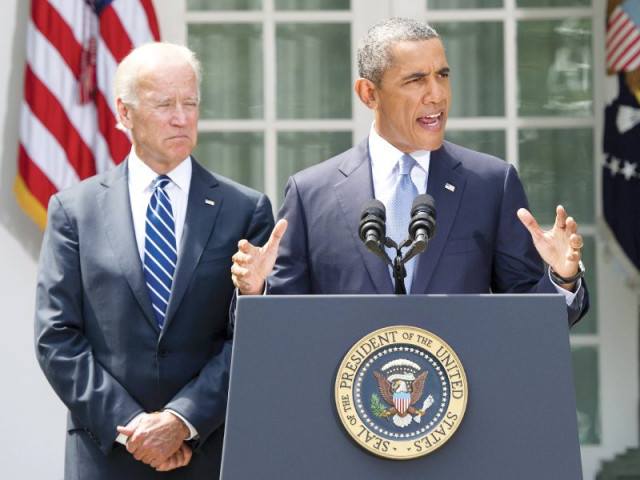Poison gas attack: US president backs off imminent Syria strike
Says he has decided to launch a military strike but only after Congress approves it.

US President Barack Obama speaks about Syria from the Rose Garden at the White House. PHOTO: AFP
US President Barack Obama on Saturday backed away from an imminent military strike against Syria to seek the approval of the US Congress, in a decision that likely delays US action for at least 10 days.
Obama, in a statement from the White House Rose Garden, said he had authorised the use of military force to punish Syria for a chemical weapons attack on Aug 21 that US officials say killed 1,429 people. Military assets to carry out a strike are in place and ready to move on his order, he said.
But in an acknowledgement of protests from US lawmakers and concerns from war-weary Americans, Obama added an important caveat: he wants Congress to approve.
Congress is currently in recess and not scheduled to return to work until Sept 9.
“Today I’m asking Congress to send a message to the world that we are ready to move as one nation,” Obama said.
Obama’s decision was a big gamble that he can gain approval from Congress in order to launch a limited strike against Syria to safeguard an international ban on chemical weapons usage, guard US national security interests and protect regional allies like Turkey, Jordan and Israel.
“I have long believed that our power is rooted not just in our military might, but in our example as a government of the people, by the people, and for the people,” Obama said.
Obama also slammed the ‘incapacity’ of the UN Security Council to act on Syria and warned the world must not be ‘paralysed’ on responding to the chemical weapons attack.
“What we have seen so far at least is an incapacity at this point for the Security Council to move forward in the face of a clear violation of international norms,” Obama said.
Obama said he understood that there was widespread war fatigue both in the United States, Britain and elsewhere, but that did not absolve nations of their responsibilities.
“Ultimately, we don’t want the world to be paralysed. And frankly, you know, part of the challenge that we end up with here is that a lot of people think something should be done, but nobody wants to do it,” he added.
Obama’s decision was also a significant shift away from what was perceived to be a strike fairly soon against Syrian targets. He had been prepared to act unilaterally after the British parliament refused to go along with American plans.
Such reticence, Obama suggested, would allow the erosion on taboos over time on the use of chemical weapons and other international norms.
Protracted and expensive wars in Afghanistan and Iraq have left Americans reluctant to get involved in Middle Eastern conflicts.
Most Americans do not want the United States to intervene in Syria. A Reuters/Ipsos poll taken this week showed only 20 percent believe the United States should take action, but that was up from 9 per cent last week.
Obama said he knew that the world was ‘war weary’ and noted Americans had gone through a decade of war and wanted to rebuild their economy.
“I assure you nobody ends up being more war-weary than me. “What I also believe is that part of our obligation as a leader in the world is making sure that when you have a regime that is willing to use weapons that are prohibited by international norms on their own people, including children, that they are held to account.”
A debate has raged for days in Washington among members of the US Congress over whether, or how quickly, Obama should take action.
Senate Republican leader Mitch McConnell backed the move, which he said Obama had told him about.
“The president’s role as commander-in-chief is always strengthened when he enjoys the expressed support of the Congress,” said McConnell.
Obama’s decision was announced after he met his national security team at the White House. Top aides were to brief senators later in the day and members of the House of Representatives are to receive a classified briefing from administration officials on Sunday.
The objective is to show solid proof that US intelligence officials say shows conclusively that the Syrian government of President Bashar al Assad launched a large chemical weapons assault in Damascus suburbs that left among the dead 426 children.
Obama has broad legal powers to take military action, and he insisted he felt he had the authority to launch a strike on his own. But he said he wanted Congress to have its say.
British Prime Minister David Cameron said he understood Obama’s decision “I understand and support Barack Obama’s position on Syria,” Cameron said in a tweet.
Meanwhile, a plane carrying UN weapons inspectors who had been gathering evidence and samples relating to alleged chemical weapons use in Syria arrived in The Netherlands on Saturday. A spokesman for the Organisation for the Prohibition of Chemical Weapons said inspectors would return to the body’s headquarters in The Hague. He said the samples the inspectors brought with them would be distributed between various laboratories for testing.
Published in The Express Tribune, September 1st, 2013.



















COMMENTS
Comments are moderated and generally will be posted if they are on-topic and not abusive.
For more information, please see our Comments FAQ